MODELING DECIMALS
Using models can help us to understand how decimals, fractions, and percent are related.
Example 1 :
Model 0.78 by shading a 10-by-10 grid.
Solution :
Since there are two digits after the decimal point in 0.78, we can write 0.78 as a fraction 78/100.
0.78 = 78/100
0.78 = 78%
0.78 = 78 out of a hundred
In 10 by- 10 grid, there will be 100 equal parts.
Because 10 x 10 = 100.
Since 0.78 = 78 out of a hundred, we have to shade 78 out 100 parts in 10 by- 10 grid to model the decimal 0.78.
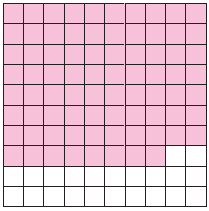
Example 2 :
Model 1.42 by shading a 10-by-10 grid.
Solution :
There are two digits after the decimal point in 1.42. So, we can write 1.42 as a fraction 142/100.
Here, the numerator 142 is greater than 100.
Since we are going to use 10 by 10- grid (100 equal parts), we can write the given decimal 1.42 as given below.

In 1.42 = 1 42/100 or 1 + 42/100, there are two parts.
They are 1 and 42/100.
So, we have to use two 10 by-10 grids to model the decimal 1.42.
Since we write 1.42 = 100/100 + 42/100, we have to shade all the 100 parts in the first grid and 42 parts in the second grid.
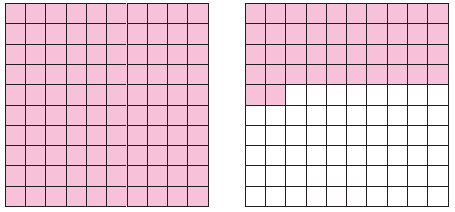
Example 3 :
Model 0.53 by shading a 10-by-10 grid.
Solution :
Since there are two digits after the decimal point in 0.53, we can write 0.53 as a fraction 53/100.
0.53 = 53/100 = 53%
0.53 = 53 out of a hundred
In 10-by- 10 grid, there will be 100 equal parts.
Because 10 x 10 = 100.
Since 0.53 = 53 out of a hundred, we have to shade 53 out 100 parts in 10 by- 10 grid to model the decimal 0.53.
That is,
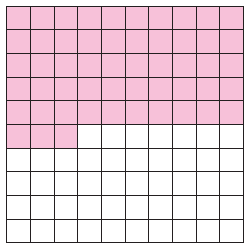
Example 4 :
Model 1.07 by shading a 10-by-10 grid.
Solution :
There are two digits after the decimal point in 1.07. So, we can write 1.07 as a fraction 107/100.
Here, the numerator 107 is greater than 100.
Since we are going to use 10 by 10- grid (100 equal parts), we can write the given decimal 1.07 as given below.
1.07 = 1 + 0.07
1.07 = 100/100 + 7/100 = 1 7/100
In 1.07 = 1 7/100 or 1 + 7/100, there are two parts.
They are 1 and 7/100.
So, we have to use two 10 by-10 grids to model the decimal 1.07.
Since we write 1.07 = 100/100 + 7/100, we have to shade all the 100 parts in the first grid and 7 parts in the second grid.
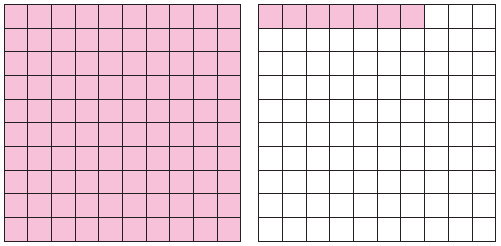
Example 5 :
Model 125% by shading a 10-by-10 grid.
Solution :
Percent means per hundred.
125% = 125/100
Here, the numerator 125 is greater than 100.
Since we are going to use 10 by 10- grid (100 equal parts), we can write 125% as given below.

125% = 1 + 25/100
Therefore, there are two parts in 125%.
They are 1 and 25/100.
So, we have to use two 10 by-10 grids to model 125%.
Since we write 125% = 100/100 + 25/100, we have to shade all the 100 parts in the first grid and 25 parts in the second grid.
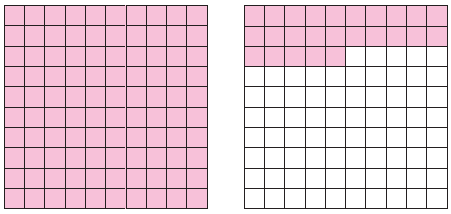
Kindly mail your feedback to v4formath@gmail.com
We always appreciate your feedback.
©All rights reserved. onlinemath4all.com
Recent Articles
-
Digital SAT Math Problems and Solutions (Part - 150)
Apr 25, 25 11:46 AM
Digital SAT Math Problems and Solutions (Part - 150) -
AP Calculus AB Problems with Solutions (Part - 19)
Apr 24, 25 11:10 PM
AP Calculus AB Problems with Solutions (Part - 19) -
AP Calculus AB Problems with Solutions (Part - 18)
Apr 24, 25 11:06 PM
AP Calculus AB Problems with Solutions (Part - 18)
